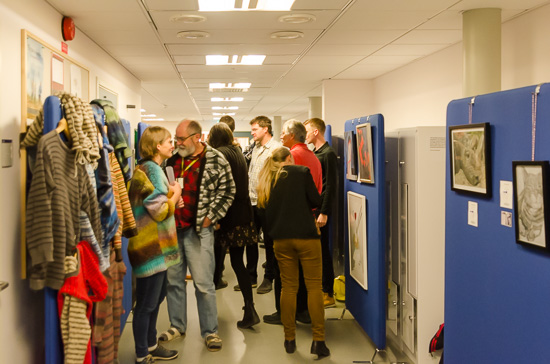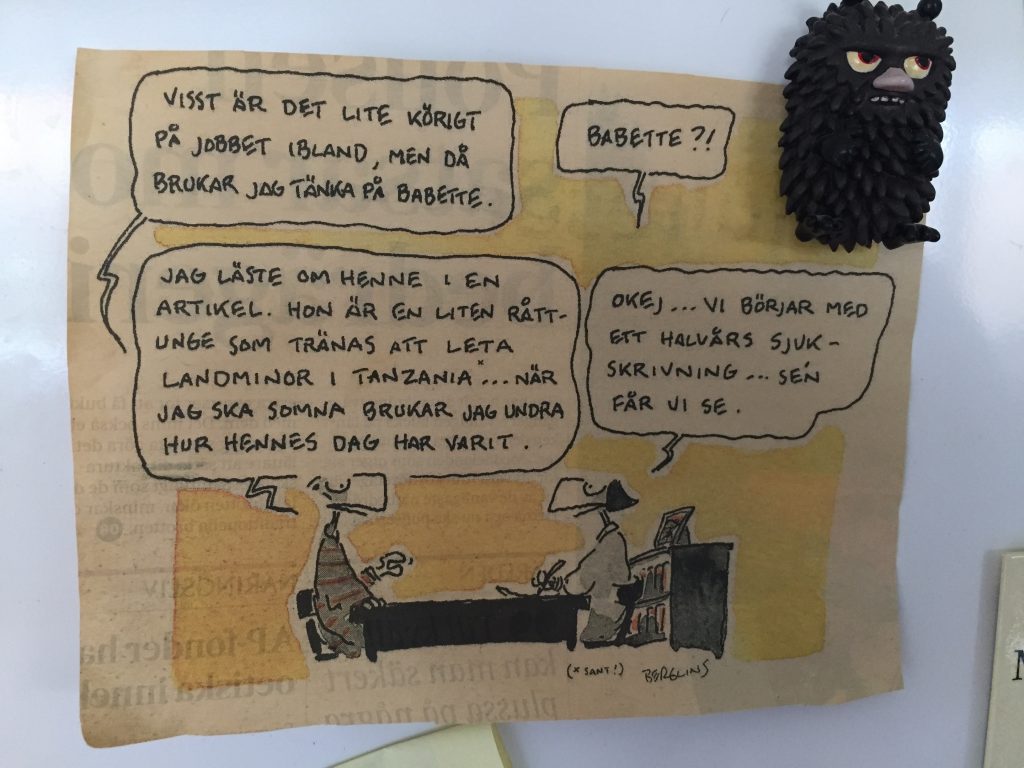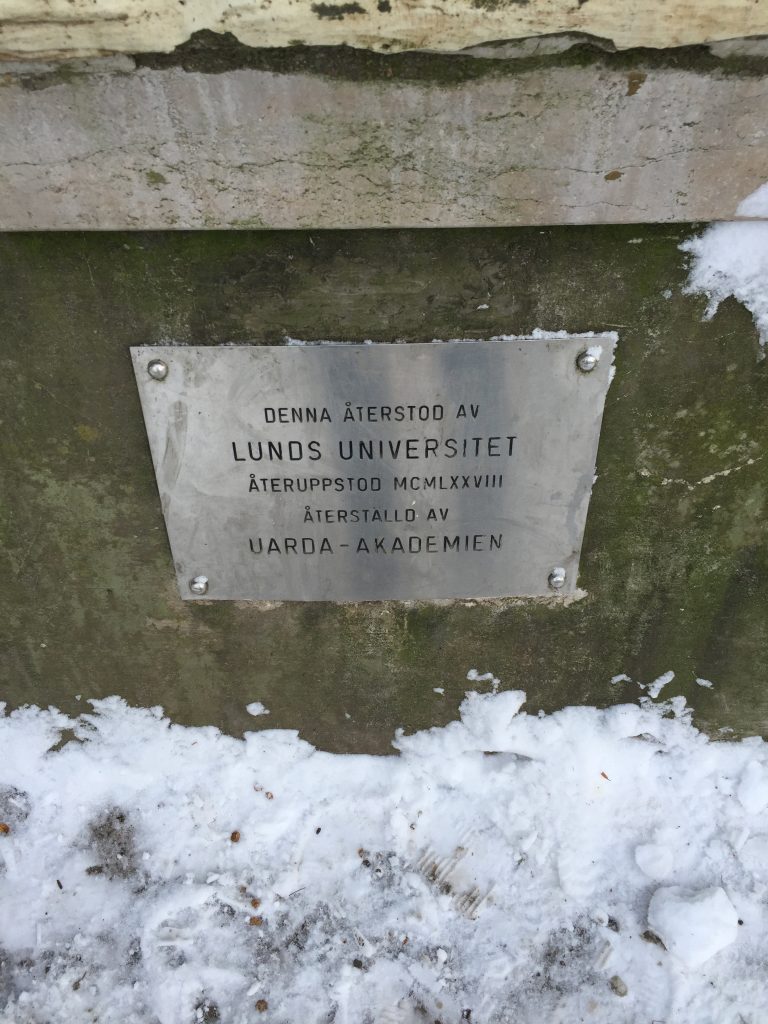
Institutionens konstutställning den 14 december lockade många, både besökare och utställare. Det var trångt och gemytligt i (mer …)
Biologiska institutionen | Lunds universitet

Institutionens konstutställning den 14 december lockade många, både besökare och utställare. Det var trångt och gemytligt i (mer …)
Det är med blandade känslor jag nu slutar som prefekt för Biologiska institutionen. Orken har av olika skäl inte riktigt räckt till det senaste året för både min forskning och att upprätthålla kvalitén i prefektskapet, ett uppdrag som annars varit väldigt stimulerande och givande. Till min stora glädje har jag mött mycket uppskattning på institutionen. Att vara prefekt på Biologiska institutionen är ingen straffkommendering utan oftast en förmån.

Det är inte möjligt – och inte meningen – att som prefekt vara alla till lags. All verksamhet är inte excellent och det som inte är tillräckligt bra skall antingen förbättras eller läggas ner. Om detta och annat går åsikterna ibland isär. Per Brinck, ”den svenska ekologins Gudfader”, sa vid något tillfälle på 90-talet till mig:
”Det är aldrig fel att fatta ett beslut, man kan alltid ändra det”.
Det är inte helt sant; en del beslut är oåterkalleliga men andra kan förvisso korrigeras om de visar sig vara fel. Ett annat av Pers ord på vägen till en ung lektor löd, faderligt yttrade när jag klagade på otillräckligheten hos någon på dåvarande Ekologiska institutionen:
”Döm inte folk efter deras dåliga utan efter deras goda sidor”.
Även det är inom rimliga gränser en god grundinställning. Biologiska institutionen är på det hela taget en fantastisk arbetsplats med många – närmare 400 om vi räknar generöst – kompetenta och hängivna medarbetare. Rekrytera rätt medarbetare och se till att de får bra förutsättningar att sköta sina uppgifter så ordnar medarbetarna sedan resten!
Som prefekt måste du orka hålla emot och värna kärnverksamheten i en tid då planer och regler väller fram som en tsunami, då kvalitetssäkring handlar mer om form, jämställdhet och mångfald än verksamhetens innehåll och resultat. Trots gällande ”chefskontrakt” har jag som prefekt alltid sett mig som kärnverksamhetens företrädare snarare än universitetsledningens förlängda arm.

Universitetet omnämns dessvärre idag ofta i termer av myndighet istället för som det universitet det borde vara.Samtidigt som det positiva klimatet på institutionen utgjort en daglig vitamininjektion så har rörelser i tiden och krafter bortom min kontroll tärt ganska hårt på min i grunden positiva inställning. Akronymer som LUCRIS, SSC, SVS och STRUT har lagt sordin på stämningen i fakultetens ledningsråd och skapat arbetsmiljöproblem på institutionen. Värdefull tid som borde ha ägnats åt angelägna diskussioner om forskning, utbildning och bildning har istället gått åt för att hantera idiotiska beslut om övergång från en fungerande lönehanteringen i egen regi till en katastrof orkestrerad av Statens Servicecenter och implementering av orimligt tidskrävande ”lönesättande samtal”, beslut som fattats på nivåer där en enkel prefekt inte har något att säga till om. När jag allt oftare kommit på mig själv med att inte bara vara kritisk utan också negativ har det sänt signaler till mig själv att det är dags för nya kvastar att sopa och fräschare krafter att ta vid.
 Den enda vägen? Biologiska institutionen skymd av vägvisare. Välj annan väg?
Den enda vägen? Biologiska institutionen skymd av vägvisare. Välj annan väg?
Mitt motto har varit ”fokus på kärnverksamheten”och jag har försökt att realisera mina blygsamma visioner genom ”management by walking around”. Genom dagliga samtal med kollegorna kan du bespara dig och institutionen många konflikter och sammanträden. Huruvida det fungerat eller ej lämnar jag för tillfället åt historien. När tiden så erbjuder finns det en hel del intressant – anekdotiskt och kanske till och med vetenskapshistoriskt och sociologiskt- att berätta om och reflektera över vad gäller tillkomsten av den biologiska storinstitutionen i Lund och dess nio första år. Spegellandet har legat i dvala de senaste åren men framöver hoppas jag få tid att återuppta forsknings- och universitetspolitiska skriverier i en eller annan form.
Jag kommer att sakna delar av umgänget med kollegor som prefektskapet erbjuder och den makt prefekten trots allt har– åtminstone på marginalen. Det går att göra skillnad. Men jag tror fortfarande på det roterande, kollegiala ledarskapet och nio år som prefekt är en lång tid. Jag står fast vid att det är viktigt att prefekter, dekaner och till och med rektorer bedriver forskning – eller för den delen undervisning – och inte förfaller till något ”professionellt ledarskap”. Det har alltid varit min avsikt att efter avslutat ledningsuppdrag återgå till kärnverksamheten. Att ständigt se sig själv i rollen som undervisande lärare och forskare i jakten på nya upptäckter och anslag och med ansvar för andra personer i en större externfinansierad forskargrupp fungerar oftast som vaccination mot verksamhetsfrämmande eller rent av verksamhetsfientliga beslut på ”ledningsnivå”.

Avslutningsvis vill jag tacka för att jag fick förtroendet att verka som institutionens prefekt under nio spännande och för mig mycket roliga år. Jag önskar nya prefekten Carin Jarl-Sunesson och institutionen lycka till under det nya året. De flesta kurvor pekar i rätt riktning – men det tillkommer säkert nya utmaningar!
Christer Löfstedt
f d prefekt
Yesterday, the Aquatic Ecology unit went to Karlaby Kro for their Christmas meeting. The two previous years they have been in the Ecology Building, but now it was time to (mer …)
Hi! My name is Cecilia Hjort and since the 1st of December I’ve been enrolled as a PhD student in the Department of Biology, under the supervision of Professor Henrik Smith. However, some of you have probably seen me around, both on the second and third floor, since I’ve been working with several different projects at the university for the past 2 years.
I intend to study the evolutionary adaptation of a common bumblebee, Bombus terrestris, to variable environments by combining comparative studies, behavioural assays and genome sequencing (Restriction site-Associated DNA sequencing; RADseq). More precisely, I will investigate if native populations of B. terrestris in Sweden are affected by gene spread from imported bumblebees used for pollination services. Additionally, I will investigate the occurrence of morphological and genetic local adaptation across landscape and climatic gradients in Sweden, using landscape genomic approaches. Lastly, I will study the genetic connectivity and evolutionary capacity of an invasive B. terrestris adapting to a novel environment (Tasmania), and compare patterns of local adaptation and landscape genetic structure with native B. terrestris.
I hold a Bachelors Degree in Biology and a Masters Degree in Conservation Biology both from Lund University.
Since I like diversity, I usually change lunchrooms so hopefully I’ll see you around!
P.S. I go by my nickname Cilla.
There will be no Christmas for the Evolutionary Ecology unit without a trip to Örenäs Castle. Around 60 persons from the unit (and some hangarounds, including me) went there to share their (mer …)
Igår var det stor avtackning av Monica Pardon. Fikarummet på andra våningen var fullt av folk som ville (mer …)
För nionde gången var det idag dags för Lund Biology Seminar. SACT hade bjudit in (mer …)
I am starting as a PhD student in the Pheromone group. I will be working on a EU Horizon 2020 project called OLEFINE, which is about making safe insecticide alternatives (pheromones) in a biological way, using cell factories and metabolic engineering. I will be doing research to find and characterise genes that can be used in biosynthetic pheromone production pathways, to make pheromones of moths that are economically important pests on cash- and row crops.
I am an engineer in biotechnology from Aalborg University, Denmark, and have in the past years been working with metabolic engineering of yeasts, employed at the Center for Biosustainability at the Danish Technical University and at the company Biophero.
Some beasts are rare and live their lives unseen by most of us. Many of the nocturnal mammals with membranous wings qualify, but so do the unsung heroes of our profession, the ones daring to tread alien and peripheral territories.
The link below refers to a both charming and erudite paper by our colleague Jens Rydell that does just that. It is a fine example of how one realm of knowledge (here bats) can transgress deep into our history and culture. Behold the grandeur of having Baudelaire in the reference list!
And don’t miss the acknowledgments.
Read the article in Journal of Bat Research and Conservation (pdf; 5.9 MB; new window).
Per Lundberg
Hello,
I have now spent the first weeks getting to know as much as I can about the organization and the people operating in it, and since the first of November I have moved into the office of administrative manager. We have outlined the administrative work ahead of us and established the four key words – structure (organization), competence, flexibility and service as our mission statement.
The first change you will see is an array on the administrative web page in English and in Swedish which aims to clarify who to contact in different matters. The first function, finances/administrator is the person closest to the unit and likely the one to turn to in most cases, and then the HR and budget & forecast help out with more specialized matters. As you see Anne is still listed as HR administrator for her units but that will change, as I mentioned last week, to Sara by the end of 2018.
This is hopefully helpful for you and a start for us to build an administrative structure that makes everyday life easier for all of us.
// Joakim Nilsson
Hej everyone! I just started my PhD in the Biology Department, under the supervision of Claes von Wachenfeldt. My research will focus on how bacteria can sense and adapt to different kinds of stress (for instance, disulfide stress).
I come from Barcelona (Spain), where I did my Bachelor’s degree in Biotechnology. Then, I performed my Master’s degree in Molecular Biology, specialization in Microbiology, at Lund University.
I am very excited to be starting this new adventure and I hope we can meet in the lunch room or in other faculty activities!
Idag (fredag 9/11) hade Edith Hammer ordnat en guidad visning av MAX IV för SACTs räkning. Aktiviteten var populär och blev snabbt fullbokad. Några av dagens deltagarna kommer (mer …)
Kommentarer